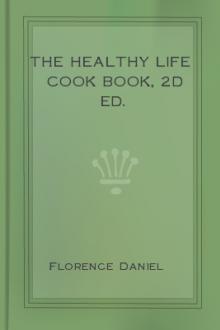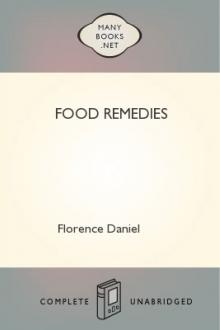The Healthy Life Cook Book, 2d ed. - Florence Daniel (the best e book reader .TXT) 📗

- Author: Florence Daniel
- Performer: -
Book online «The Healthy Life Cook Book, 2d ed. - Florence Daniel (the best e book reader .TXT) 📗». Author Florence Daniel
Fruit is best taken at the evening meal, from 1-1/2 to 2 lbs. Nothing should be taken with it except a little nut-cream or fresh cream and white of egg.
Distilled water is a great asset to the unfired feeder, because it softens dried fruits so much better than hard water. It can be manufactured at home, or the "Still Salutaris" bought through a chemist or grocer. The "Still Salutaris" water is about 1/3 per gallon jar. If the water is distilled at home, a "Gem" Still will be needed. (The Gem Supplies Co., Ltd., 67, Southwark Street, London S.E.). It is best to use this over a gas ring or "Primus" oil stove. The cost of the water comes out at about one penny per gallon, according to the cost of the fuel used.
Distilled Water should never be put into metal saucepans or kettles, as it is a very powerful solvent. A small enamelled kettle or saucepan should be used for heating it, and it should be stored in glass or earthenware vessels only. It should not be kept for more than a month, and should always be kept carefully covered.
For salads it is not necessary to depend entirely upon the usual salad vegetables, such as lettuce, endive, watercress, mustard and cress. The very finely shredded hearts of raw Brussel sprouts are excellent, and even the heart of a Savoy cabbage. Then the finely chopped inside sticks of a tender head of celery are very good. Also young spinach leaves, dandelion leaves, sorrel and young nasturtium leaves. The root vegetables should also be added in their season, raw carrot, turnip, beet, onion and leek, all finely grated. A taste for all the above-mentioned vegetables, eaten raw, is not acquired all at once. It is best to begin by making the salad of the ingredients usually preferred and mixing in a small quantity of one or two of the new ingredients. For those who find salads very difficult to digest, it is best to begin with French or cabbage lettuce and skinned tomatoes only, or, as an alternative, a saucerful of watercress chopped very finely, as one chops parsley.
1. COTTAGE CHEESE.Allow the juice of two medium-sized lemons to 1 quart of milk. Put the milk and strained lemon-juice into an enamelled pan or fireproof casserole and place over a gas ring or oil stove with the flame turned very low. Warm the milk, but do not allow it to boil. When the milk has curdled properly the curds are collected together, forming an "island" surrounded by the whey, which should be a clear liquid. Lay a piece of cheese-cloth over a colander and pour into it the curds and whey. Gather together the edges of the cloth and hang up the curds to drain for at least thirty minutes. Then return to the colander (still in cloth) and put a small plate or saucer (with a weight on top) on the cheese. It should be left under pressure for at least one hour. This cheese will keep two days in cold weather, but must be made fresh every day in warm weather. The milk used should be some hours old, as quite new milk will not curdle. The juice from one lemon at a time should be put into the milk, as the staler the milk the less juice will be needed. Too much juice will prevent curdling as effectually as too little.
This cheese is greatly improved by the addition of fresh cream. Allow two tablespoonsful of cream to the cheese from one quart of milk. Mash the cheese with a fork and lightly beat the cream into it.
Note. Cheese-cloth, sometimes known as cream-cloth, may be bought at most large drapers' shops at from 6d. to 8d. per yard. One yard cuts into four cloths large enough for straining the cheese from one quart of milk. Ordinary muslin is not so useful as it is liable to tear. Wash in warm water (no soap or soda), then scald well.
2. DRIED FRUITS.These should be well washed in lukewarm water and examined for worms' eggs, etc. Then cover with distilled water and let stand for 12 hours or until quite soft and swollen. Prunes, figs, and raisins are all nice treated in this way.
3. EGG CREAM.2 tablespoons fresh cream, the white of 1 egg.
Put the white of egg on to a plate and beat to a stiff froth with the flat of a knife. (A palette knife is the best.) Then beat the cream into it. This makes a nourishing dressing for either vegetable salad or fruit salad. Especially suitable for invalids and persons of weak digestion.
4. PINE-KERNEL CHEESE.Wash the kernels and dry well in a clean cloth. Spread out on the cloth and carefully pick over for bad kernels or bits of hard shell. Put through the macerator of the nut-butter mill. Well mix with the beaten pulp of a raw tomato (first plunge it into boiling water for a few minutes, after which the skin is easily removed). Raw carrot juice, or any other vegetable or fruit juice pulp may also be used.
5. RAW CARROT JUICE.Well scrub a medium sized carrot and grate it to a pulp on an ordinary tinned bread grater. Put the pulp into a cheese cloth and squeeze out the juice into a cup.
6. TWICE BAKED BREAD.Cut moderately thin slices of white bread. Put into a moderate oven and bake until a golden colour.
Granose biscuits warmed in the oven until crisp serve the same purpose as twice-baked bread, i.e., a cereal food in which the starch has been dextrinised by cooking. But the biscuits being soft and flaky can be enjoyed by those for whom the twice-baked bread would be too hard.
XV.—WEIGHTS AND MEASURES AND UTENSILS.If possible sieve all flour before measuring, as maggots are sometimes to be found therein; also because tightly-compressed flour naturally measures less than flour which has been well shaken up.
1 lb. = 16 ozs. = 3 teacupsful or 2 breakfastcupsful, closely filled, but not heaped.
1/2 lb. = 8 ozs. = 1 breakfastcupful, closely filled, but not heaped.
1/4 lb. = 4 ozs. = 1 teacupful, loosely filled.
1 oz. = 2 tablespoonsful, filled level.
1/2 oz. = 1 tablespoonful, filled level.
1/4 oz. = 1 dessertspoonful, filled level.
4 gills = 1 pint = 3-1/2 teacupsful, or nearly 2 breakfastcupsful.
1 gill = 1 small teacupful.
10 unbroken eggs weigh about 1 lb.
1 oz. butter = 1 tablespoon heaped as much above the spoon as the spoon rounds underneath.
USEFUL UTENSILS.BAKING DISHES.—Earthenware are the best.
BREAD GRATER.—The simple tin grater, price 1d., grates bread, vegetables, lemon rind, etc.
BASINS.—Large for mixing, small for puddings, etc.
EGG SLICE.—For dishing up rissoles, etc.
EGG WHISK.—The coiled wire whisk, price 1d. or 2d., is the best.
FOOD CHOPPER.—See that it has the nut-butter attachment.
FRYING BASKET and stew-pan to fit.
FRYING AND OMELET PANS.—Cast aluminium are the best.
GEM PANS.JARS.—Earthenware jars for stewing.
JUGS.—Wide-mouthed jugs are easiest to clean.
JELLY AND BLANC MANGE MOULDS.LEMON SQUEEZER.—The glass squeezer is the best.
MARMALADE CUTTER. NUT MILL. NUTMEG GRATER.PALETTE KNIFE.—For beating white of egg, scraping basins, etc.
PASTE BOARD and ROLLING PIN.
PESTLE and MORTAR.
PRESERVING PAN.—Copper or enamelled.
RAISIN SEEDER.SAUCEPANS.—Cast aluminium are the best.
SCALES AND WEIGHTS.SIEVES.—Hair and wire.
STILL.—For distilling water.
STRAINERS.TINS.—Cake tin, qr. qtn. tin, vegetable and pastry cutters.
XVI.—MENUS.The menus given below do not follow the conventional lines which ordain that a menu shall include, at least, soup, savoury and sweet dishes. The hardworking housewife can afford neither the time nor the material to serve up so many dishes at one meal; and the wise woman does not desire to spend any more time and material on the needs of the body than will suffice to keep it strong and healthy. Lack of space will not allow me to include many menus. I have only attempted to give the barest suggestions for two weeks. But a study of the rest of the book will enable anyone to extend and elaborate them. Three meals a day are the most that are necessary, and no woman desires to cook more than once a day. If possible the cooked meal should be the mid-day one. Late dinners may be fashionable, but they are not wholesome. If the exigencies of work make the evening meal the principal one, let it be taken as early as possible.
WARMING UP.It often happens that while the father of a family needs his dinner when he comes home in the evening, it is necessary to provide a mid-day dinner for the others, especially if children are included. Many housewives thus go to the labour of preparing a hot dinner twice a day, but this may be avoided if the following directions are carefully carried out:—Prepare the mid-day meal as if the father were at home, and serve him first. Put his portion—savoury, vegetables and gravy—in one soup plate, and cover it immediately with another. Do the same with the pudding, and put both dishes away in the pantry. A good hour before they are wanted put into a warm oven. (If a gas oven is used, see that there is plenty of hot water in the floor pan.)
When quite hot the food should not be in the least dried up. This is ensured by having the oven warm, but not hot, warming up the food slowly, and, in the first place, covering closely with the soup plate while still hot, so that the steam does not escape. I have eaten many dinners saved for me in this way, and should never have known they were not just cooked if I had not been told. Of course, a boiled plain pudding or plum pudding can be returned to its basin and steamed and extra gravy saved and reheated in the tureen.
SUNDAY AND MONDAY.The cook needs a day of rest once a week as well as other people. And this should be on a Sunday if possible, so that she may participate in the recreations of the other members of her family. This is more easily attainable in summer than in winter, for in hot weather many persons prefer a cold dinner. But even in winter, soups, vegetable stews, nut roasts, baked fruit pies, and boiled puddings can all be made the day before. They will all reheat without spoiling in the least.
Monday is the washing-day in many households, and no housewife wants to cook on that day. In flesh-eating households cold meat forms the staple article of diet. The vegetarian housewife cannot do better than prepare a large plain pudding on the Saturday, boil it for two hours, put it away in its basin, and boil it two hours again on Monday; with what is left over from Sunday, this will probably be sufficient for Monday's dinner.
BREAKFASTS.A sufficient breakfast may consist simply of bread and nut butter, with the addition of an apple or other fresh fruit. A good substitute for tea and coffee is a fruit soup. Where porridge and milk are taken, this would probably not be needed. Eggs, cooked tomatoes, marmalade, and grated nuts are all welcome additions.
HIGH TEAS.If tea is taken, let it be as weak as possible. Do not let it stand for more than three minutes after making, but pour it immediately off from the leaves into another pot. See that the latter is hot.
Some of the simpler savoury dishes (omelets, etc.) may be taken at this meal if desired. Also lentil and nut pastes, salads, Wallace cheese, raisin bread, oatcake, sweet cakes and biscuits, jams, etc.
DINNERS.SUNDAY.—Hot nut roast and brown gravy; steamed potatoes and cabbage; fruit tart and custard.
MONDAY.—Cold nut roast and salad; bubble and squeak; plain pudding and golden syrup.
TUESDAY.—Haricot rissoles and tomato sauce; baked potatoes; milk pudding and stewed fruit, or apple and tapioca pudding.
WEDNESDAY.—Lentil soup; jam roll.
THURSDAY.—Lentil soup; fig pudding.
FRIDAY.—Hot pot; roasted pine kernels; steamed potatoes and cauliflowers; railway pudding.
SATURDAY. Irish stew; boiled rice





Comments (0)